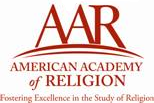Religion:American Academy of Religion
The American Academy of Religion (AAR) is the world's largest association of scholars in the field of religious studies and related topics. It is a nonprofit member association, serving as a professional and learned society for scholars involved in the academic study of religion. It has some 10,000 members worldwide, with the largest concentration being in the United States and Canada. AAR members are university and college professors, independent scholars, secondary teachers, clergy, seminarians, students, and interested lay-people.
History
AAR was founded in 1909 as the Association of Biblical Instructors in American Colleges and Secondary Schools.[1] The name was changed to National Association of Biblical Instructors (NABI) in 1933. The American Academy of Religion was adopted as the organization name in 1963[2] to reflect its broader, inclusive mission to foster the academic study of all religions.[3] Over its long history, AAR has broadened its scope to reflect contemporary values of its membership, such as responding to feminist scholarship and women in religion, increased attention to religions beyond Christianity, differentiation between theology and/or religious reflection within the academic study of religion as a cultural/historical/political phenomenon, and engagement with the public understanding of religion. Presidents of the AAR have included well-known scholars such as Judith Plaskow, Mark Juergensmeyer, Wendy Doniger, Emilie Townes, Peter J. Paris, Rebecca Chopp, Elizabeth A. Clark and Ann Taves.
Publications
Oxford University Press publishes Journal of the American Academy of Religion on behalf of the AAR.[4] Religious Studies News is the quarterly newspaper of record for the organization; it transitioned from a print to online-only publication in 2010. AAR published the online book review Reading Religion. AAR publishes five book series through Oxford University Press: Academy; Reflection and Theory in the Study of Religion; Religion, Culture, and Theory; Religion in Translation; and Teaching Religious Studies. AAR presents awards each year to notable books in the study of religion. It offers three categories of Awards for Excellence: Analytical-Descriptive Studies, Historical Studies, and Constructive-Reflective Studies.
Annual meeting
AAR hosts an Annual Meeting each year in November. The AAR Annual Meeting is the world's largest meeting for religious studies scholars. Over 400 events, including meetings, receptions, and academic sessions, occur on the AAR program alone; hundreds more, hosted by affiliated societies and institutions, occur over the course of the meeting. Some 10,000 people attend the AAR Annual Meeting; the location of the meeting changes each year. The AAR Annual Meeting program is developed entirely by volunteers involved in program units representing disciplines and sub-disciplines within the field.
Other activities
AAR offers activities on a regional level for its members. Professional development resources such as research grants, career services, and scholarships are some of the member benefits. AAR also advocates the importance of the critical study of religion on institutional and national levels.
Presidents
- 1910–1925: Charles Foster Kent
- 1926: Irving Francis Wood
- 1927: Eliza H. Kendrick
- 1928: Walter W. Haviland
- 1929: Ralph K. Hickok
- 1930: Irwin R. Beiler
- 1931: Laura H. Wild
- 1932: Chester Warren Quimby
- 1933: James Muilenburg
- 1934: Elmer W. K. Mould
- 1935: Florence M. Fitch
- 1936: S. Ralph Harlow
- 1937: Frank G. Lankard
- 1938: Mary E. Andrews
- 1939: William Scott
- 1940: Harvie Branscomb
- 1941: Katherine H. Paton
- 1942–1943: Edgar S. Brightman
- 1944: Floyd V. Filson
- 1945: Mary Ely Lyman
- 1946: J. Paul Williams
- 1947: Rolland E. Wolfe
- 1949: Vernon McCasland
- 1950: Virginia Corwin
- 1951: Mary Francis Thelen
- 1952: Charles S. Braden
- 1953: Carl E. Purinton
- 1954: W. Gordon Ross
- 1955: Arthur C. Wickenden
- 1956: A. Roy Eckardt
- 1957: Robert M. Montgomery
- 1958: H. Neil Richardson
- 1959: Lauren Brubaker Jr.
- 1960: Lionel Whiston Jr.
- 1961: Robert V. Smith
- 1962: Fred D. Geally
- 1963: Clyde A. Holbrook
- 1964: Ira Martin
- 1965: James Price
- 1966: William Hordern
- 1967: John Priest
- 1968: J. Wesley Robb
- 1969: Jacob Neusner
- 1970: Claude Welch
- 1971: James Burtchaell
- 1972: Robert Michaelson
- 1973: Charles Long
- 1974: Christine Downing
- 1975: William E. May
- 1976: Preston Williams
- 1977: Schubert M. Ogden
- 1978: John Meagher
- 1979: Langdon Gilkey
- 1980: William Clebsch
- 1981: Jill Raitt
- 1982: Gordon D. Kaufman
- 1983: Wilfred Cantwell Smith
- 1984: Ray Hart
- 1985: Wendy Doniger
- 1986: Nathan A. Scott Jr.
- 1987: John Dillenberger
- 1988: Martin E. Marty
- 1989: Robert Wilken
- 1990: Elizabeth A. Clark
- 1991: Judith Berling
- 1992: Robert Cummings Neville
- 1993: Edith Wyschogrod
- 1994: Catherine Albanese
- 1995: Peter Paris
- 1996: Lawrence Sullivan
- 1997: Robert Detweiler
- 1998: Judith Plaskow
- 1999: Margaret R. Miles
- 2000: Ninian Smart
- 2001: Rebecca Chopp
- 2002: Vasudha Narayanan
- 2003: Robert Orsi
- 2004: Jane Dammen McAuliffe
- 2005: Hans J. Hillerbrand
- 2006: Diana L. Eck
- 2007: Jeffrey Stout
- 2008: Emilie Townes
- 2009: Mark Juergensmeyer
- 2010: Ann Taves
- 2011: Kwok Pui-lan
- 2012: Otto Maduro
- 2013: John Esposito
- 2014: Laurie Zoloth
- 2015: Thomas Tweed
- 2016: Serene Jones
- 2017: Eddie Glaude
- 2018: David P. Gushee
- 2019: Laurie L. Patton[5]
References
- ↑ Gearon, Liam (2013). MasterClass in Religious Education: Transforming Teaching and Learning. London / New York: Bloomsbury Academic. p. 40. ISBN 9781441160065. http://www.worldcat.org/oclc/825398792. Retrieved 14 April 2015.
- ↑ Clark, Elizabeth (2011). Founding the Fathers. University of Pennsylvania Press. p. 8. ISBN 978-0-8122-4319-2. http://www.worldcat.org/oclc/794700594. Retrieved 14 April 2015.
- ↑ "History of the American Academy of Religion". Official AAR website. Archived from the original on 28 December 2008. https://web.archive.org/web/20081228235153/http://www.aarweb.org/About_AAR/History/default.asp. Retrieved 2008-12-18.
- ↑ "Journal of the American Academy of Religion". Oxford University Press Journals website. http://jaar.oxfordjournals.org. Retrieved 2011-04-09.
- ↑ "Past Presidents". Atlanta, Georgia: American Academy of Religion. https://www.aarweb.org/node/243.
External links


